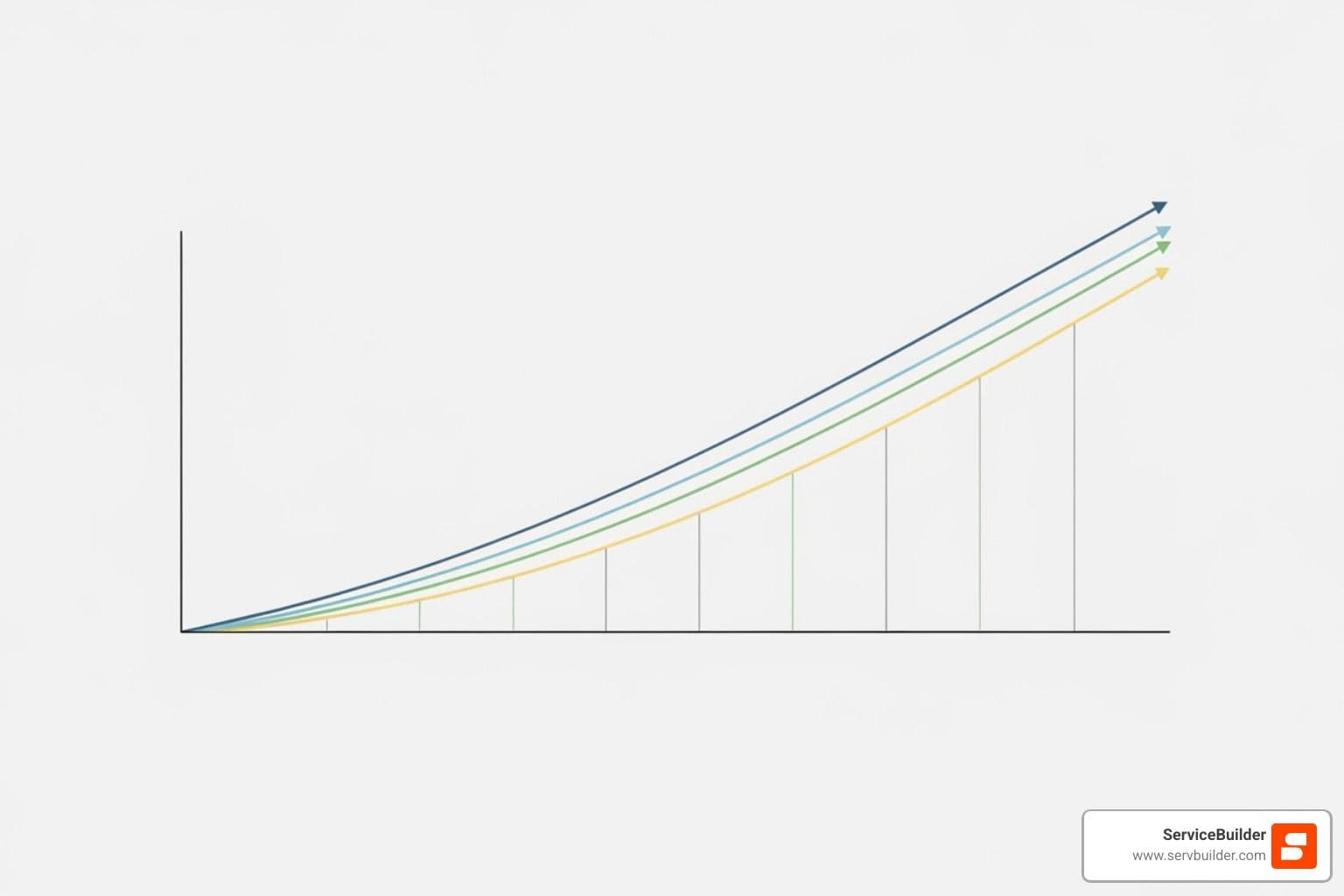Why Your Business Needs a Marketing Automation Company (Hint: It's Not Just Emails)
- Andrew Leger
Why Marketing Automation is a Game Changer¶
A marketing automation company provides software and services to help businesses:
Automate repetitive marketing tasks: Streamline emails, social media posts, and lead nurturing.
Personalize customer interactions: Deliver custom messages based on buyer needs and timing.
Nurture leads efficiently: Guide prospects through the sales funnel with automated journeys.
Track performance and ROI: Gain insights into campaign effectiveness and optimize strategies.
Doing all your marketing manually is a huge time sink. Sending thousands of personalized emails or tracking every customer journey by hand isn't scalable. That's where a marketing automation company steps in.
They offer powerful software to automate these tasks, letting you connect with more customers, personalize interactions, and grow your business without endless manual work. It's about working smarter, not harder, to increase efficiency and achieve better results.
With over 15 years of experience in automating workflows, I understand what makes a marketing automation company truly effective.
Simple guide to marketing automation company terms:
automated business communication
automated business process workflow
automated appointment confirmation
What is Marketing Automation? Core Functions Beyond the Inbox¶
Marketing automation is more than just sending bulk emails; it's like a smart assistant that handles repetitive marketing tasks, letting you focus on growth. Modern platforms act like a personal concierge for each customer, learning their preferences and delivering the right message at the right time based on their interactions.
The real power comes from lead nurturing and customer journey mapping. Automation platforms create pathways to guide prospects from their first interaction to becoming loyal customers. They use triggers and actions—think "if this happens, then do that"—to create seamless experiences across every touchpoint.
Audience segmentation lets you treat different customer groups uniquely. For example, your HVAC customers get winter heating tips, while lawn care clients receive spring preparation advice—all personalized without manual work.
Want to dive deeper into business communication? Check out more about automated business communication and how it transforms customer relationships.
Core Functionalities¶
A good marketing automation company offers tools that work together seamlessly.
Email marketing is the foundation, but it's smart email that adapts content based on reader behavior.
SMS marketing is ideal for appointment reminders, urgent updates, and time-sensitive offers. Some platforms like Salesmate even use AI to craft these messages.
Social media scheduling keeps your brand visible without you posting manually every day.
Lead scoring tells you which prospects are ready to buy based on their engagement.
Retargeting ads give you a second chance with visitors who left without converting by showing them relevant ads on other websites.
Analytics and reporting turn activity into actionable insights, showing which campaigns work and where to invest your effort. For businesses wanting to automate their entire workflow, explore automated business process workflow solutions.
How It Powers Personalized Customer Journeys¶
This is where marketing automation gets exciting. Behavioral triggers respond instantly to actions like website visits or form submissions. For example, downloading a guide can trigger a follow-up email with pricing.
Dynamic content personalizes a single email template for different audiences, like showing commercial cleaning services to a restaurant owner and residential options to a homeowner.
A/B testing removes the guesswork by testing different subject lines or calls-to-action and automatically using the winning version.
Consistent messaging across all channels—email, SMS, social media, your website—ensures customers get a cohesive experience. The result is improved customer engagement that feels natural, not robotic, building trust and moving prospects closer to a sale.

Want to explore software that helps with personalization? Check out Personalization software options.
The Tangible Benefits: How Automation Drives Business Growth¶
Marketing automation delivers tangible benefits that go straight to your bottom line. When you implement it, you're not just buying software—you're investing in a system that transforms how your business grows.

Key benefits include:
Increased efficiency: Your team stops wasting hours on repetitive tasks like manual follow-ups.
Higher conversion rates: Prospects receive the right message at the right moment, making them more likely to buy.
Improved marketing ROI: Every dollar works smarter by targeting the right people with precision.
Better lead quality: Your sales team focuses on prospects who are actually ready to buy.
Sales and marketing alignment: Both teams work from the same data, creating a smooth handoff that feels seamless to customers.
All of this is powered by data-driven decisions, so you'll finally know which campaigns drive revenue and where to invest your next marketing dollar.
Real-World Results¶
Real businesses are seeing incredible outcomes. One museum achieved 206% revenue growth year-over-year thanks to email automation. Another company generated $76,717 from a single email campaign by leveraging automated workflows.
The time savings alone can be game-changing. One business saved 36 hours per month while experiencing 200% revenue growth—nearly a full work week returned to focus on strategy.
E-commerce businesses see particularly impressive results. Vodafone increased conversions by 159% with automated cart reminders, while Clarins saw a 45% increase in lead capture and achieved 30x ROI in 12 weeks.
For service businesses, companies report 40% increases in subscribers and additional revenue streams exceeding $100,000 through strategic automation. The pattern is clear: businesses that adopt marketing automation don't just save time—they fundamentally transform their growth trajectory.
For field service companies looking to optimize their entire operation, understanding how Automated Accounts Receivable System integration can amplify these marketing automation benefits becomes crucial for sustainable growth.
Choosing the Right Marketing Automation Company for Your Business¶
Choosing the right marketing automation company is crucial, as there's no single "best" option. The ideal platform depends on your business size, industry, budget, and technical comfort. Your choice should also be scalable to support future growth.
To get a feel for what's out there, you can always explore different Marketing automation platforms.
For Small to Mid-Sized Businesses (SMBs)¶
SMBs typically need a solution that's easy to use, offers a good mix of features, and provides solid support. The goal is often an all-in-one platform that simplifies marketing and sales.
Popular choices for SMBs include:
HubSpot Marketing Hub: Known for its user-friendly interface and inbound marketing tools. It integrates well with its CRM and offers free tools to start.
Keap: Focuses on ease of use for automating marketing, sales, and service, featuring a drag-and-drop builder, AI assistance, and templates.
Brevo: Offers a solid set of tools for businesses focusing on email and SMS marketing.
ActiveCampaign: A hit with SMBs for its smart automation and personalized email marketing, offering free one-on-one coaching and data migration.
Salesmate: Stands out for its user-friendly interface, lead nurturing, and an AI assistant (Sandy AI) for crafting personalized messages.
vcita: Designed for small businesses, it integrates SMS and email and acts as a central hub for marketing, scheduling, billing, and client interactions.
For more helpful tips on managing clients when you're an SMB, definitely check out our guide on Client Management Software for Small Businesses.
For E-commerce and B2C Brands¶
E-commerce brands need a platform that connects to their online store, segments customers by shopping habits, and offers features to build loyalty and suggest products.
Top picks include:
Klaviyo: Calls itself "the only CRM built for B2C," focusing on personalized interactions to build brand loyalty and drive growth.
Drip: Known for its e-commerce-specific automation, making it easy to build visual workflows for the purchasing journey.
Omnisend: Offers a strong suite of tools covering email, SMS, and web push notifications, with pre-built workflows for cart abandonment and welcome series.
For Enterprise and Complex B2B Needs¶
Larger organizations and B2B companies with intricate sales cycles need a heavyweight platform designed for scale, advanced analytics, and deep integrations.
Leading platforms include:
Salesforce Marketing Cloud: A comprehensive suite for managing customer journeys across all channels, with deep integration into the Salesforce CRM.
Adobe Marketo Engage: An AI-powered platform for B2B companies to personalize engagement, nurture leads, and generate predictable revenue.
HubSpot Marketing Hub: While great for SMBs, its full suite (Sales and Service Hubs) creates a formidable, unified platform for enterprise-level management.
Competitor Snapshot: HubSpot vs. ActiveCampaign vs. Keap¶
To help you decide, let's compare three leading competitors for small to mid-sized businesses:
HubSpot Marketing Hub:
Best For: Businesses prioritizing an all-in-one solution with a powerful, free CRM. Its strength lies in inbound marketing content creation and lead management.
Key Feature: A user-friendly interface and a vast ecosystem of integrations. The free tools provide an excellent entry point.
Consideration: Can become expensive as your contact list grows and you need more advanced features.
ActiveCampaign:
Best For: Businesses that need sophisticated automation and email marketing capabilities without the enterprise price tag.
Key Feature: Advanced automation builder that allows for complex, conditional workflows. Strong focus on personalization and lead scoring.
Consideration: The sheer number of features can be overwhelming for beginners compared to simpler platforms.
Keap (formerly Infusionsoft):
Best For: Service-based small businesses and solopreneurs who need a combined CRM, marketing, and sales automation tool.
Key Feature: "Easy Automations" and a visual campaign builder designed to simplify the process for non-marketers. Also includes invoicing and payment processing.
Consideration: While powerful, its primary focus is on the small business/solopreneur market, and it may not scale as well for rapidly growing mid-sized companies as HubSpot or ActiveCampaign.
Key Factors for Choosing a marketing automation company¶
Consider these factors when making your decision:
Integrations: Check if the platform connects with your essential tools like your CRM and accounting software for efficient workflows.
Pricing Models: Understand the pricing structure—is it based on contacts, features, or usage? Look for models that charge only for marketed contacts to save costs.
Customer Support: What kind of help is available? Look for 24/7 support, personalized onboarding, or dedicated training.
Ease of Use: Can your team learn it quickly? An intuitive interface with a drag-and-drop builder is a huge plus.
Feature Set: Does it have the tools you need now and for future growth? Consider email, SMS, social media, lead scoring, and A/B testing.
Future Roadmap: Is the company constantly innovating with new features, especially in areas like AI? A commitment to growth ensures your investment stays relevant.
For a holistic approach to managing your business operations, don't forget to explore Business Operations Management Tools.
The Tech Evolution: AI, Personalization, and the Future of Automation¶
The world of marketing automation is rapidly evolving. What began as simple email campaigns has transformed into sophisticated, intelligent marketing systems powered by Artificial Intelligence.
Today's marketing automation company platforms don't just follow pre-programmed rules—they learn, adapt, and make smart decisions on their own, creating new opportunities for businesses to connect with customers.

The Role of AI in Modern Marketing Automation¶
AI is now the heart of modern marketing automation, fundamentally changing customer engagement.
Predictive lead scoring uses AI to analyze hundreds of data points, accurately identifying prospects ready to buy and helping sales teams prioritize efforts.
AI content generation tools assist marketers by crafting personalized email content, freeing them to focus on strategy.
Send-time optimization uses AI to learn each individual's habits, sending emails when they are most likely to be opened.
Next-best-channel prediction determines whether a customer responds best to SMS, email, or another channel.
Autonomous marketing systems, pioneered by companies like ActiveCampaign, can analyze goals and execute strategic next steps automatically.
Emerging Trends: What's Next for a marketing automation company?¶
The future of marketing automation is moving toward systems that truly understand and anticipate customer needs.
Proactive automation will predict what customers need and reach out first, such as sending HVAC maintenance reminders based on weather patterns.
Deeper AI integration will lead to campaigns that self-optimize in real-time, removing guesswork.
Privacy-first marketing is becoming essential, with successful platforms building trust through transparency while still delivering personalized experiences.
Conversational marketing through advanced AI chatbots is exploding, handling complex inquiries 24/7.
Customer Data Platforms (CDPs) are creating unified customer profiles that break down silos between departments, leading to seamless, personalized experiences.
The evolution isn't just about better technology—it's about creating genuine connections with customers at scale.
Frequently Asked Questions about Marketing Automation¶
Here are answers to a few common questions about marketing automation.
What's the difference between Marketing Automation and a CRM?¶
It's easy to confuse them, but they have different jobs. A CRM (Customer Relationship Management) system is primarily for sales, managing existing customer data and relationships (bottom of the funnel). Marketing Automation (MA) is for marketing, focusing on generating and nurturing new leads (top and middle of the funnel).
When integrated, they create a seamless journey from someone just learning about you to becoming a loyal customer. Many modern platforms, like HubSpot, offer both CRM and MA features in one package.
Want to dive deeper into CRMs? Check out our insights on CRM Platform.
Can marketing automation work for service-based businesses?¶
Yes, absolutely. While often associated with e-commerce, it's incredibly powerful for service businesses like HVAC, lawn care, or cleaning.
Imagine using automation to send automated appointment confirmations and reminders, which is huge for cutting down on no-shows. If a customer requests a quote but doesn't book, an automated email series can gently follow up with success stories or a special offer.
You can also set up automated review requests after a service or send seasonal service reminders for things like HVAC check-ups. After a service call, an automated follow-up sequence can check on customer satisfaction or suggest related services. Many marketing tools can integrate with your existing client management software, allowing you to sync client lists and run targeted campaigns.
We at ServiceBuilder understand the unique needs of field service businesses. Adding a smart marketing automation strategy to our streamlined operational platform can significantly boost your growth.
Want to learn more? Check out Automated Appointment Confirmation and Field Service Management Software Solutions.
How do I measure the ROI of marketing automation?¶
Measuring your Return on Investment (ROI) is key to knowing if your strategy is working. Track these key metrics:
Customer Acquisition Cost (CAC): Efficient lead nurturing should lower the cost of gaining a new customer.
Customer Lifetime Value (LTV): Personalized engagement encourages customers to stay longer and buy more, boosting their LTV.
Lead-to-Customer Conversion Rate: This shows what percentage of leads become paying customers. A higher rate means your nurturing is effective.
Campaign Attribution: Your software can show you exactly which automated messages led to a sale.
Time Savings: Calculate the hours saved by automating manual tasks.
By checking these numbers, you can fine-tune your plans and clearly show the value a marketing automation company brings to your business.
For tips on managing other business costs, explore our insights on Automated Expense Management Tools.
Conclusion: Automate to Accelerate, Not Just to Email¶
As we've seen, a marketing automation company offers more than just email campaigns. It's a growth engine that streamlines tasks, personalizes customer experiences, and uses AI to anticipate needs. The benefits are real and measurable, from 206% revenue growth to saving 36 hours per month.
Choosing the right partner is key. SMBs might prefer HubSpot or Keap, e-commerce brands may lean toward Klaviyo, and enterprises often turn to powerhouses like Salesforce Marketing Cloud or Adobe Marketo Engage.
However, we've learned from working with thousands of field service businesses that the foundation matters. The best marketing automation is ineffective without solid operations. If your business runs on spreadsheets and sticky notes, you're building on quicksand.
For field service businesses—HVAC, lawn care, cleaning, pest control—success starts with getting your operational house in order. This means streamlined scheduling, dispatch, and quoting. When these fundamentals are solid, marketing automation becomes incredibly powerful because you can deliver on the promises your campaigns make.
ServiceBuilder provides this operational backbone. Purpose-built for the U.S. field service industry, our platform helps businesses modernize operations without complexity. With a mobile-first design and AI-assisted scheduling, we create the perfect foundation for marketing automation to work its magic.
Think of it this way: marketing automation brings you leads, but you need rock-solid operations to turn those opportunities into success. Combining ServiceBuilder's efficiency with smart marketing automation creates a powerful system that works around the clock to grow your business.
Ready to build something great? Build your business on a strong foundation and see how operational excellence and smart automation can transform your field service business.